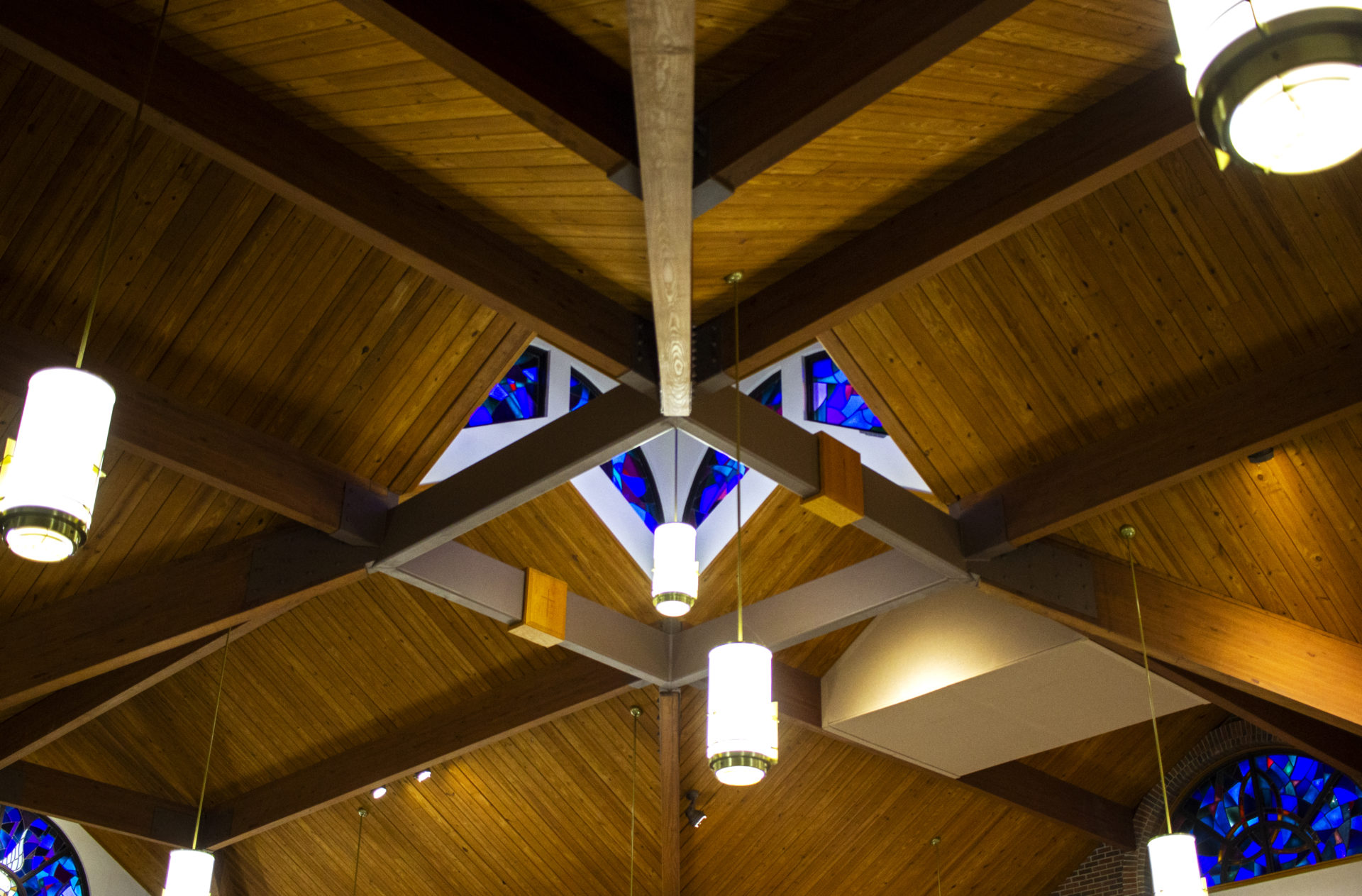| Baptism | Penance | Eucharist | Confirmation |
| Matrimony | Holy Orders | Extreme Unction |
Sacraments are outward signs instituted by Jesus Christ to give grace. There are seven sacraments: Baptism, Confirmation, Holy Eucharist, Penance, Extreme Unction, Holy Orders, and Matrimony.
Each sacrament has an outward sign, known as “form,” and a set formula of words to be said, known as “matter.” Once the sign has been applied to the one receiving the sacrament, it signifies an inward grace that has the power to be produced in the soul.
It is fitting that we have these outward signs of God’s grace, because our nature cannot perceive the invisible act of grace on its own. Sacraments provide the faithful with a means of perceiving and giving understanding to what would otherwise be unknown.
Jesus Christ instituted the gift of the sacraments in order to assist people in their spiritual needs. These gifts provide us with a spiritual rebirth, a spiritual strengthening, a spiritual nourishment, a cure for spiritual sickness due to sin, a spiritual preparation for death of our bodies and the beginning to everlasting life, the means for clergy to provide for the Church, and a fulfillment of the social needs of the Church through marriage.
Sacraments also signify sanctifying grace, which is necessary for our salvation. Sanctifying grace gives our souls a new life, one shared in the life of God himself.
“Amen, amen, I say to you, unless you eat the flesh of the Son of Man, and drink his blood, you shall not have life in you. He who eats my flesh and drinks my blood has life everlasting and I will raise him up on the last day” (John 6:54-55).
“Receive the Holy Spirit; whose sins you shall forgive, they are forgiven them; and whose sins you shall retain, they are retained” (John 20:22-23).
“Now when the apostles in Jerusalem heard that Samaria had received the word of God, they sent to them Peter and John. On their arrival they prayed for them, that they might receive the Holy Spirit; for as yet he had not come upon any of them, but they had only been baptized in the name of the Lord Jesus. Then they laid their hands on them and they received the Holy Spirit” (Acts 8:14-17).
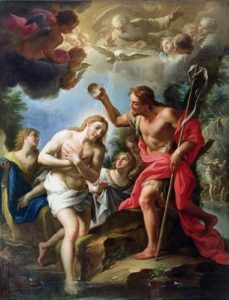
“Unless a man be born again of water and the Spirit he cannot enter into the kingdom of God.” (John 3:5).
Baptism is the sacrament that signifies the beginning of our spiritual lives. Through baptism, our souls are given new life through sanctifying grace. We become children of God and ultimately, the heirs to heaven.
Baptism is the most essential of all of the sacraments in that it is through baptism that we may begin the spiritual journey to everlasting life. Baptism introduces us to the spiritual family of God on Earth (the Church). Furthermore, it is only through baptism that all other sacraments are made possible.
When a person is baptized, they are saved from the mark of original sin, which all men inherit through the falling of Adam and Eve. Baptism also washes away the other form of sin, which is actual sin. All temporal punishments are also taken away through this sacrament.
Once Adam and Eve lost the grace of God through sin, they became subject to all of the human vices. As heirs of original sin, man became subject to ignorance, uncontrolled passions, pain, and death. While baptism washes away original sin permanently, man is still subject to human flaws and continue to commit actual sin after all sins have been washed away from baptism.
Priests and deacons are the usual ministers of baptism. A baptism is made valid when they poor water over the head of the person receiving the sacrament. While doing so, the priest or deacon must say “I baptize thee in the name of the Father, and the Son, and the Holy Spirit.” However, in circumstances where a person is in an immediate danger of death, a lay person may, and should, administer the sacrament. There are three valid means for baptism: by way of immersion, pouring, or sprinkling of water.
Over the years, the Catholic Church has developed many different ceremonies for baptism. While it is not a necessity, priests and deacons often anoint the baptized with a special ointment blessed by a bishop at the Solemn Mass on Holy Thursday. The priest anoints the breast and back of the recipient with the oil of catechumens before the pouring of the water, and anoints the recipients head with chrism afterwards.
“All power in heaven and on Earth has been given to me. Go, therefore, and make disciples of all nations, baptizing them in the name of the Father, and of the Son, and of the Holy Spirit, teaching them to observe all that I have commanded you; and behold, I am with you all days, even unto the consummation of the world” (Matthew 28:18-20).

“But if the wicked do penance for all his sins which he hath committed and keep all my commandments and do judgment and justice, living he shall live, and shall not die. I will not remember all his iniquities that he hath done: in his justice which he hath wrought, he shall live. Is it my will that a sinner should die, saith the Lord God, and not that he should be converted from his ways and live?” (Ezechiel 18:21-23).
Penance is the sacrament by which sins of the faithful committed after baptism are forgiven through absolution by a priest. The sacrament offers a supernatural virtue that prompts the faithful to detest their sins and seek forgiveness for their transgressions and resolve to amend their lives.
While our sins were washed away at baptism, we are imperfect and continue to sin long after baptism. For this reason, Jesus Christ offered the faithful a means for receiving forgiveness and absolution for sins that were committed. Most importantly, it provides a way to restore sanctifying grace and virtue lost after one commits a mortal sin. Mortal sin deprives the sinner of supernatural life. Through the Sacrament of Penance, God raises the sinner from death and renews the path to supernatural life.
Penance also increases and strengthens sanctifying grace for those who were not in a state of mortal sin and thus, is an important sacrament even for those who have not fallen from grace. In addition to forgiveness and restoration or increasing of grace, penance has the effect of remitting eternal punishment, if necessary, and also of part of temporal punishment due to sin. Penance helps us to avoid sin in the future and restores the merits of our good works if they have been lost to mortal sin.
While no man can by his own power absolve sin, Jesus Christ has given this power to priests, who are working as God’s representatives. For Jesus Christ said to His apostles and their successors in the priesthood: “Receive the Holy Spirit; whose sins you shall forgive, they are forgiven them; and whose sins you shall retain, they are retained.”
In administering the Sacrament of Penance, the priest forgives sins with the words: “I absolve thee from thy sins in the name of the Father, and of the Son, and of the Holy Spirit. Amen.” The power to forgive sins through these words is given to the priest at his ordination. However, the priest must have permission (jurisdiction) from his bishop in order to do so, except under extraordinary circumstances.
In order to receive a worthy confession, the sinner must make an examination of conscience, be truly sorry for sins committed, have a strong purpose of not sinning again, confess sins to a priest, and be willing to perform the penance the priest gives.
“But if thy brother sin against thee, go and show him his fault, between thee and him alone. If he listen to thee, thou hast won thy brother. But if he does not listen to thee, take with thee one or two more so that on the word of two or three witnesses every word may be confirmed. And if he refuse to hear them, appeal to the Church, but if he refuse to hear even the Church, let him be to thee as the heathen and the publican. Amen I say to you, whatever you bind on earth shall be bound also in heaven; and whatever you loose on earth shall be loosed also in heaven” (Matthew 18:15-18).
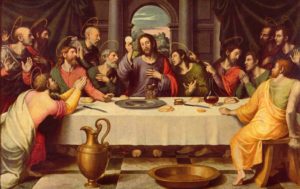
“And while they were at supper, Jesus took bread, and blessed and broke, and gave it to his disciples, and said, ‘Take and eat; this is my body.’ And taking a cup he gave thanks and gave it to them, saying, ‘All of you drink of this; for this is my blood of the new covenant, which is being shed for many unto the forgiveness of sin’” (Matthew 26:26-28).
The Sacrament of the Holy Eucharist was instituted by Jesus Christ at the Last Supper. In the Holy Eucharist, under the appearance of bread and wine, Jesus Christ is contained, offered and received. His body and His blood are really, truly, and substantially present in the Holy Eucharist.
Furthermore, the Holy Eucharist is not only a sacrament, but also, a sacrifice. In the Old Testament, the Jewish people offered sacrifices by means of fruit, animals, or bread and wine. Jesus Christ provided us with an opportunity for a new, perfect sacrifice through his own crucifixion.
By offering the body and blood of Jesus Christ, we give thanks for the sacrifice He made, which was necessary for our own salvation. In addition to commemorating and renewing the sacrifice Jesus made on the cross, the Holy Eucharist serves the purpose of being received by the faithful for a Holy Communion and to remain ever on our altars as the proof of His love for us, and to be worshiped by us.
Jesus loved us so much that He didn’t leave us after His death. For, by instituting the Holy Eucharist, He remains with us in body and in Spirit through the daily sacrifice of the Mass. The principal effect of this Communion is to nourish our souls spiritually. The Holy Eucharist strengthens our souls, helps us to live a holy life and bring us to the happiness of heaven.
The “Transubstantiation” of bread and wine into the body and blood of Christ can only be done through an ordained Catholic priest. When a priest consecrates the host, they act in the person of Christ. This is seen in the words of Christ at the Last Supper when he said, “This is My body… This is My blood.” Jesus gave power for the priest to minister this sacrament at the Last Supper when He said, “Do this in remembrance of Me.”
For the faithful to receive the Sacrament of the Holy Eucharist, they must be baptized and a member of the Catholic Church. They must also be in a state of grace – that is, free from grave (mortal) sin. After taking classes about the Catholic faith and deciding to become a part of the Catholic community, a person will receive baptism (if necessary), make their first confession (if necessary), and the Holy Eucharist at their first Mass as an official member. Once they have received their first Holy Communion, they may receive the sacrament on a regular basis.
For those who are already Catholic, it is necessary to make their first confession prior to receiving the Holy Eucharist for the first time. This is because they have already been baptized and have accumulated sin over the years. For Catholics, first Holy Communion is made at about 7 years of age (in the Latin Rite).
“Jesus therefore said to them, ‘Amen, amen, I say to you, unless you eat the flesh of the Son of Man, and drink his blood, you shall not have life in you. He who eats my flesh and drinks my blood has life everlasting and I will raise him up on the last day. For my flesh is food indeed, and my blood is drink indeed. He who eats my flesh, and drinks my blood, abides in me and I in him. As the living Father has sent me, and as I live because of the Father, so he who eats me, he also shall live because of me. This is the bread that has come down from heaven; not as your fathers ate the manna, and died. He who eats this bread shall live forever’” (John 6:54-59).
“For I myself have received the Lord (what I also delivered to you), that the Lord Jesus, on the night in which he was betrayed, took bread, and giving thanks broke, and said, ‘This is my body which shall be given up for you; do this in remembrance of me.’ In like manner also the cup, after he had supped, saying, ‘This cup is the new covenant in my blood; do this as often as you drink it, in remembrance of me. For as often as you shall eat this bread and drink the cup, you proclaim the death of the Lord, until he comes.’ Therefore whoever eats this bread or drinks the cup of the Lord unworthily, will be guilty of the body and the blood of the Lord. But let a man prove himself, and so let him eat of that bread and drink of the cup; for he who eats and drinks unworthily, without distinguishing the body, eats and drinks judgment to himself” (I Corinthians 11:23-29).
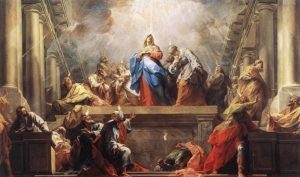
“And when the days of Pentecost were drawing to a close, they were all together in one place. And suddenly there came a sound from heaven, as of a violent wind blowing, and it filled the whole house where they were sitting. And there appeared to them parted tongues as of fire, which settled upon each of them. And they were all filled with the Holy Spirit and began to speak in foreign tongues, even as the Holy Spirit prompted them to speak” (Acts 2:1-4).
Confirmation is the sacrament in which the Holy Spirit descends upon the faithful and strengthens their souls in a unique way and enables each person the power to profess his or her faith as perfect Christians and as soldiers of our Lord and Savior Jesus Christ.
Confirmation – which means strengthening – increases sanctifying grace, gives a special sacramental grace, and imprints a lasting character upon our souls. This character is a mark, signifying that we are soldiers of Christ and is a sign that lasts for eternity. The sacramental grace of confirmation helps us to live a life that is faithful and loyal to Jesus Christ. It also gives us a right to the actual graces that we need when tempted against our faith.
The usual minister of the Sacrament of Confirmation is the bishop. However, in extraordinary cases, a bishop can give a priest the authority to administer the sacrament. When a bishop gives the sacrament, he places his hands over those who are to be confirmed, prays that they may receive the Holy Spirit, and anoints each person’s forehead with a holy chrism in the form of the cross. While anointing each person’s forehead, the bishop says: “I sign thee with the sign of the cross and I confirm thee with the chrism of salvation, in the name of the Father, and of the Son, and of the Holy Spirit.”
The chrism used is blessed on Holy Thursday and is used for confirmation ceremonies throughout the designated periods of the church calendar. The chrism is a mixture of olive oil and balm. Olive oil in holy chrism signifies the strengthening grace of the Holy Spirit. Balm signifies the sweetness of virtue and the freedom from the corruption of sin.
“On hearing this they were baptized in the name of the Lord Jesus; and when Paul laid his hands on them, the Holy Spirit came upon them, and they began to speak in tongues and to prophesy” (Acts 19:5-6).
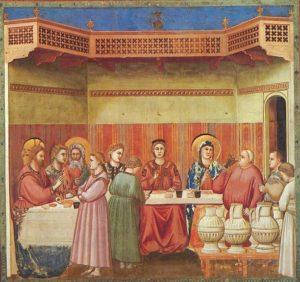
“And God created man to his own image; to the image of God he created him. Male and female he created them. And God blessed them, saying increase and multiply, and fill the earth” (Genesis 1:27-28).
“Wherefore a man shall leave father and mother, and shall cleave to his wife: and they shall be two in one flesh” (Genesis 2:24).
“And there came to him some Pharisees, testing him, and saying, ‘Is it lawful for a man to put away his wife for any cause?’ But he answered and said to them, “Have you not read that the Creator, from the beginning, made them male and female, and said “for this cause a man shall leave his father and mother, and cleave to his wife, and the two shall become one flesh”?
Therefore now they are no longer two, but one flesh. What therefore God has joined together, let no man put asunder.’ They said to him, ‘Why then did Moses command to give a written notice of dismissal, and to put her away?’ He said to them, ‘Because Moses, by reason of the hardness of your heart, permitted you to put away your wives; but it was not so from the beginning. And I say to you, that whoever puts away his wife, except for immorality, and marries another, commits adultery; and he who marries a woman who has been put away commits adultery’”(Matthew 19:3-9)
The Sacrament of Matrimony is one in which a baptized man and a baptized woman bind themselves for life in a lawful marriage. Through this sacrament, couples receive the special grace to discharge their duties. While unbaptized person can truly be married, it is not possible for them to receive the Sacrament of Matrimony and its corresponding graces.
The union of marriage is one that was instituted by God at the beginning of human existence, when He made Eve as a helpmate for Adam. Marriage was further sanctified when our Lord performed his first miracle at the wedding feast of Cana, which was for the benefit of the bride and the groom.
The Sacrament of Matrimony is conferred by the man and the woman upon each other and serves as a contract that is binding until death. For, Christ said “What therefore God has joined together, let no man put asunder.” Therefore, only in special circumstances may a marriage be dissolved and such actions must be made through the Church’s own legal procedures. The dissolving of a marriage by the Church is called an “annulment.” For a person to remarry without receiving an annulment is considered to be an adulterous relationship.
In order to receive the sacrament worthily, the bride and groom must be in a state of grace. And it is therefore customary for a good confession to be made prior to the initiating of the sacrament. Furthermore, it is only lawful through the Church if the marriage is ministered by the parish priest, the bishop of the diocese, or by a priest delegated by either the bride or the groom. And the marriage must take place before at least two witnesses.
The chief duties of this sacrament are for the bride and groom to be faithful to each other and to provide in all possible ways for the children the marriage produces. Through the will of God, parents have the right and obligation to provide food, clothing, shelter, and an education for their children. These responsibilities remain to the authority of the parents and any worldly power which tries to interfere in these responsibilities is unjust.
The Sacrament of Matrimony aids couples in fulfilling their new responsibilities through an increase in sanctifying grace and through fostering love for each other, the strength to bear with each others faults, and the will to bring children up properly.
“Be subject to one another in the fear of Christ. Let wives be subject to their husbands as to the Lord; because a husband is head of the wife, just as Christ is head of the Church, being himself savior of the body. But just as the Church is subject to Christ, so also let wives be to their husbands in all things. Husbands, love your wives, just as Christ also loved the Church, and delivered himself up for her, that he might sanctify her, cleansing her in the bath of water by means of the word; in order that he might present to himself the Church in all her glory, not having spot or wrinkle or any such thing, but that she might be holy and without blemish. Even thus ought husbands also to love their wives as their own bodies. He who loves his own wife, loves himself. For no one ever hated his own flesh; on the contrary he nourishes and cherishes it as Christ also does the Church (because we are members of his body, made from his flesh and from his bones). ‘For this cause a man shall leave his father and mother, and cleave to his wife; and the two shall become one flesh.’This is a great mystery–I mean in reference to Christ and to the Church. However, let each one of you also love his wife just as he loves himself; and let the wife respect her husband” (Ephesians 5:21-33).
Those considering marriage need to notify our pastor of intention to marry 6 months prior to tentative wedding date. Wedding dates will be finalized only after consultation with a priest and attendance and participation in an approved marriage program. Please call the Mary Mother of God Parish office for more details.
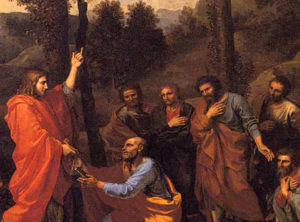
– Nicolas Poussin, 1636
“Do not neglect the grace that is in thee, granted to thee by reason of prophecy with the laying on of hands of the presbyters. Meditate on these things; give thyself entirely to them, that the progress may be manifest to all. Take heed to thyself and to thy teaching, be earnest in them. For in so doing thou wilt save both thyself and those who hear thee” (1 Timothy 4:14-16).
The Sacrament of Holy Orders provides men with the power and grace to perform the sacred duties of bishops, priests, and other ministries of the Church. Of these ministries are three major orders and four minor ministries of the Church. The three major orders of the Church are the order of deacon, priest, and bishop. The four minor ministries are those of porter, lector, acolyte, and exorcist.
Bishops are priests who have received the fullness of holy orders, which provides them with the power to administer the Sacraments of Holy Orders and Confirmation. A cardinal is a priest or bishop that has been selected to advise and assist the Pope in the government of the Church. And vicar generals are priests who have been appointed by a bishop to help with the government of a diocese, and therefore, shares in the jurisdictional powers of a bishop.
There are two forms of priests: those who serve the bishop in the form of a diocesan priest, and those who are obedient to an abbot in the form of a religious priest. Diocesan priests minister to local parishes and religious priests take on many different ministries for the Church, with each depending on the religious order and its mission. While the duties of religious priests vary, they all must adhere in obedience to their designated abbot.
Deacons assist their bishops and priests in celebrating the divine ministries of the Church. The most important of these is assisting priests in the Eucharistic celebration, distributing Holy Commuion, proclaiming the Gospels, preaching, blessing marriages, presiding over funerals, ministering baptism, and dedicating themselves to various ministries of charity.
Porters hold the function of opening and shutting the doors of the Church. Lectors are responsible for reading aloud the Old and New Testaments in the church. Acolytes hold the function of serving the sacred ministers at the Altar. While these orders continue to exist in the church and special ceremonies for receiving the Sacrament of Holy Orders is given to all four minor orders, the duties of these ministries have in large part been outsourced to the laity of individual parishes, particularly in smaller cities and towns where there are no person’s who have received the corresponding sacrament of holy orders. The function of an exorcist is to drive out demons from the bodies of the possessed and is now exclusively assigned by bishops.
When a candidate for the priesthood receives the Sacrament of Holy Orders, he receives the benefits of an increase in sanctifying grace, special sacramental graces, and a character lasting for eternity, which is a special sharing in the priesthood of Christ.
The Sacrament of Holy Orders gives the priest special supernatural powers. These powers are the ability to change bread and wine into the body and blood of Christ in the Holy Sacrifice of the Mass and the power to forgive sins in the Sacrament of Penance.
In order for a man to receive the Sacrament of Holy Orders, he must be in a state of grace and have excellent character, have the prescribed age and learning, have the intention of devoting his life to the sacred ministry, and be called to holy orders by his bishop.
“And the Lord spoke to Moses, saying: This is the law of the Levites: From twenty-five years old and upwards, they shall go in to minister in the tabernacle of the covenant” (Numbers 8:23-24).
“And having taken bread, he gave thanks and broke, and gave it to them, saying, ‘This is my body, which is being given for you; do this in remembrance of me.’ In like manner he took also the cup after the supper, saying, ‘This cup is the new covenant in my blood, which shall be shed for you’” (Luke 22:19-20).
“And Jesus drew near and spoke to them saying, “All power in heaven and on earth has been given to me. Go, therefore, and make disciples of all nations, baptizing them in the name of the Father, and the Son, and of the Holy Spirit, teaching them to observe all that I have commanded you; and behold, I am with you all days, even unto the consummation of the world’” (Matthew 28:18-20).
“For every high priest taken from among men is appointed for men in the things pertaining to God, that he may offer gifts and sacrifices for sins. He is able to have compassion on the ignorant and erring, because he himself also is beset with weakness, and by reason thereof is obliged to offer for sins, as on behalf of the people, so also for himself. And no man takes the honor to himself; he takes it who is called by God, as Aaron was” (Hebrews 5:1-4).
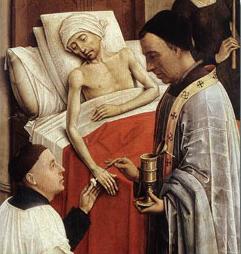
“And going forth, they preached that men should repent, and they cast out many devils, and anointed with oil many sick people, and healed them” (Mark 6:12-13).
The Sacrament of Extreme Unction is a sacrament given to the sick and those in danger of death. The term was used often in past centuries, but today, the more common expression is the “Sacrament of the Anointing of the Sick.” Extreme Unction refers to when the sacrament is administered: in cases of “extremity.” Meaning, the sacrament is used for when one has severe illness or is in great danger of dying. The term Unction means the anointing of oil.
Extreme unction is ministered by a priest through blessed oil and his prayer. It gives health and strength to the soul and in some cases, to the body when the person receiving the sacrament is in danger of death from sickness, an accident, or old age.
For the faithful receiving the sacrament, extreme unction increases sanctifying grace within them, comforts them in sickness and an increasing strength against temptation, preparation for entrance into heaven by the remission of venial sins and the cleansing of the soul from the remains of sin, and provides health of the body when God determines it is good for the soul.
Extreme unction cleanses the soul from the spiritual weakness and indifference caused by sin. And in some special cases, the sacrament can cleanse a soul of mortal sin, but only if the person receiving the gift is unconscious or incapable of making a confession and has made an act of imperfect contrition since committing the sin.
If a person is able, he should prepare for the sacrament by making a good confession and by resigning to the will of God. It is always helpful for a person to make good acts of faith, hope, and charity as well.
In cases where a person is unconscious or even if a person has died suddenly or unexpectedly, extreme unction can be administered by a priest. This is because we do not know how long the soul remains in the body after death, and so it is always beneficial to apply the sacrament in these special cases.
Only a priest can administer extreme unction. When doing so, a priest anoints the eyes, the ears, the nostrils, the lips, the hands, and the feet of the sick person. However, in cases of emergency – where there is no time to anoint all places – the priest may make one single anointment on the forehead. When making the anointment, the priest says the following prayer: “Through this holy anointing, and His most tender mercy, may the Lord forgive you whatever sins you may have committed by sight” (by hearing, etc.).
“Is any one among you sick? Let him bring in the presbyters of the Church and let them pray over him, anointing him with oil in the name of the Lord. And the prayer of faith will save the sick man, and the Lord will raise him up, and if he be in sins, they shall be forgiven him” (James 5:14-15).

